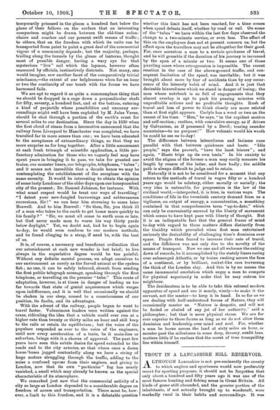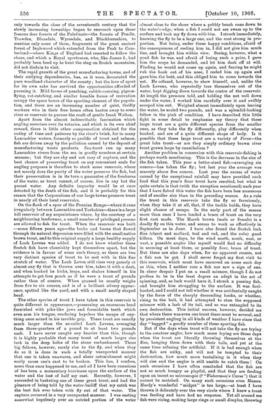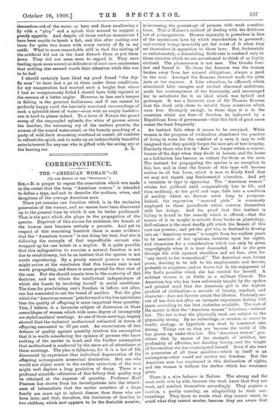TROUT IN A LANCASHIRE HILL RgSBILVOIR.
ALTHOUGH Lancashire is not pre-eminently the county to which anglers and sportsmen would now preferably resort for sporting purposes, it should not be forgotten that only about a hundred and fifty years ago it was one of the most famous hunting and fishing areas in Great Britain. All kinds of game still abounded, and the greater portion of the inhabitants, if not actually brought up to woodcraft, were markedly rural in their habits and surroundings. It was
only towards the close of the seventeenth century that the slowly increasing townships began to encroach upon those famous deer forests of the Palatinate—the forests of Pendle, Trawden, Bleasdale, Wyresdale, and Blackburnshire, to mention only some of them, fragments of the great ancient forest of Inglewood which extended from the Peak to Cum- berland—where Kings of England had resorted to follow the chase, and which a Royal sportsman, who, like James I., had probably been bred up to hunt the stag on Scotch mountains, did not disdain to visit.
The rapid growth of the great manufacturing towns, and of their outlying dependencies, has, as it were, devastated the pure woodland character of the county ; but the love of sport for its own sake has survived the opportunities afforded of pursuing it. Mild forms of poaching, rabbit-coursing, pigeon- flying, rat-catching, and similar bumble forms of recreation occupy the spare hours of the sporting element of the popula- tion, and there are an increasing number of quiet, thrifty workers who in their free hours often hasten away to some river or reservoir to pursue the craft of gentle Izaak Walton.
Apart from the almost indescribable fascination which angling exercises over its votaries, and which is its own chief reward, there is little other compensation obtained for the outlay of time and patience by the river's brink, for in many Lancashire waters, formerly so prolific of trout and salmon, fish are driven away by the pollution caused by the deposit of manufacturing waste products. Sea-trout run up many Lancashire rivers from the sea in goodly numbers at certain seasons ; but they are shy and not easy of capture, and the best chance of preserving trout on any convenient scale for angling purposes is therefore to stock some reservoir, where not merely does the purity of the water preserve time fish, but their preservation is in its turn a guarantee of the freshness of the water, as trout cannot, of course, live in any but the purest water. Any definite impurity would be at once detected by the death of the fish, and it is probably for this reason that the Corporations of our large towns preserve trout in nearly all their local reservoirs.
On the flank of a spur of the Pennine Range—where it runs irregularly between Lancashire and Yorkshire—there is a large hill reservoir of my acquaintance where, by the courtesy of a neighbouring landowner, a small number of privileged persons are allowed to fish for trout. When the reservoir was built —some fifteen years ago—the becks and burns that flowed through its natural depression were filled with the small native brown trout, and to this original supply a large healthy supply of Loch Levens was added. I do not know whether these Scotch fish have clannishly kept themselves apart, but the evidence is in favour of some such theory, as there are two very distinct species of trout to be met with in this fine stretch of water. The Loch Leven still rises very gamely at almost any fly that is thrown over him, takes it with a dash, and when hooked he kicks, leaps, and shakes himself in his attempts to get free ?inch as if he were a trout of pounds rather than of ounces. When grassed he usually weighs from five to six ounces, and is of a brilliant silvery appear- ance, spotted like the yard, and with a small neatly shaped bead.
The other species of trout I have taken in this reservoir is quite different in appearance,—possessing an enormous head furnished with pike-like jaws and formidable teeth which even arm his tongue, rendering hopeless the escape of any- thing once seized in his terrible grip. These trout are usually much larger than the so-called Loch Levens, averaging from three-quarters of a pound to at least two pounds each. I have never caught any heavier than this, though it is highly probable that many trout of much larger size lurk in the deep holes of the stone embankment. These big fellows, however, rarely rise to the fly, and when they do so it is done in such a totally unexpected manner that one is taken unawares, and sheer astonishment might easily cause one's cast to be broken. This has, I confess, more than once happened to me, and all I have been conscious of has been a momentary hurricane upon the surface of the water and the lose of half my cast. Recently, however, I succeeded in basketing one of these great trout, and had the pleasure of being told by the water-bailiff that my catch was the best fish ever taken with fly out of that water. The capture occurred in a very unexpected manner. I was casting somewhat hopelessly over an untried portion of the water
almost close to the shore where a pebbly beach runs down to the water's-edge, when a fish I could not see swam up to the surface and took my fly down with him. I struck immediately, knowing the fly to be a large one, and the cast strong in pro- portion. Not being, under these happy conditions, afraid of the consequences of reeling him in, I did not give him much line, and brought him within view. Seeing, however, what a good fish he was, and afraid of losing such a prize, I gave him the scope he demanded, and let him dash off at will. Finding he would not come up again, and fearing he might rub the hook out of his nose, I reeled him up again and gave him the butt, and this obliged him to come towards the net. He refused, however, to show himself, and, unlike the Loch Levens, who repeatedly toss themselves out of the water, kept digging down towards the centre of the reservoir. At length the pressure told, and holding the net well down under the water, I worked him carefully over it and swiftly scooped him out. Weighed almost immediately upon leaving the water, he scaled two pounds, and was a splendid-looking fellow in the pink of condition. I have described this little fight in some detail to emphasise my theory that these large trout are a quite different species from the smaller ones, as they take the fly differently, play differently when hooked, and are of a quite different shape of body. Is it possible that these large trout are a variety of Per0Z—the great lake trout—or are they simply ordinary brown river trout grown large by cannibalism ?
Another problem in connexion with this reservoir-fishing is perhaps worth mentioning. This is the decrease in the size of the fish taken. This year a better-sized fish—averaging six ounces—has taken the fly; but last year the average was scarcely above five ounces. Last year the excess of water caused by the exceptional rainfall may have provided such food that this year's finer trout have resulted, but what is quite certain is that (with the exception mentioned) each year that I have fished this water the fish have been less numerous and of smaller size than in the preceding season. As a.rule the trout in this reservoir take the fly so ferociously, when they take it at all, that, if the tackle holds, they have slight chance of escape. In the early part of the season more than once I have landed a brace of trout on the very first cast made. The March brown (male or female) is a deadly fly on this water, and seems to work as effectively in September as in June. I have also found the Scotch loch flies (claret and mallard, teal and red, and the zulu) good killers. On most days, be the wind north, south, east, or west, a passable angler like myself would find no difficulty in securing at least three, or possibly four, brace of trout. But there are also days when, for no apparent reason, not a fish can be got. I shall never forget my first visit to this reservoir, which must have occurred on some such day as this, when I neither rose a fish nor saw a sign of one. In sheer despair I put on a small minnow, though I do not profess to be in the least degree an adept in the art of spinning, and, as luck would have it, I struck a passing fish, and brought him struggling to the surface. It was foul- hooked, anal could not tell whether it was accidentally caught by the force of the sham-ply descending hooks, or whether, rising to the bait, it had attempted to stun the supposed minnow with a lash of its tail, and so was entangled to its own destruction. This initial success, however, decided the that where there was even one trout there must be several, and by persistent angling in all kinds of weather I have since that day " bagged" a goodly number of these sporting fish.
But if the days when trout will not take the fly are trying to the amateur angler, how much more trying are those days when the trout are literally throwing themselves at the flies, banging them down with their tails, and yet at the same time refusing the artificial. If it is bad enough when the fish are sulky, and will not be tempted to their destruction, bow much more tantalising is it when they will rise and the angler is still unable to catch them ! On such occasions I have often concluded that the fish are not so much hungry as playful, and that they are feeding upon an insect so microscopic (? "Fisherman's Curse ") that it cannot be matched. On many such occasions even Messrs. Hardy's wonderful "midget" is too large,—at least I have thrown. it delicately over the very circle where I knew a trout was feeding and have had no response. Yet all around me fish were rising, making large rings or small dimples, throwing
themselves out of the water, or here and there swallowing a fly with a "plop" and a splash that seemed to suggest a greedy appetite. And despite all these surface manceuvres I have been unable to touch a fish, and this after casting over them for quite two hours with every variety of fly in my outfit. What is more remarkable still is that the casting of the artificial did not in the least disturb them or put them down. They did not seem even to regard it. They were feeding upon some morsel so delicate or of such rare occurrence that nothing else seemed worth their attention while this was to be bad.
I should certainly have liked my good friend "the dry- fly man" to have had a go at them under these conditions, for my exasperation had reached such a height that where I had so conspicuously failed I should have fully rejoiced at the success of a better angler. However, to lose one's temper in flailing is the greatest foolishness, and if one cannot be perfectly happy amid the heavenly moorland surroundings of such a splendid sheet of water—even with an empty basket— one is bard to please indeed. To a lover of Nature the grand sweep of the empurpled uplands, the whirr of grouse across the heather, the unceasing cry of the restless peewits, the scream of the scared water-ousel, or the homely quacking of a party of wild duck streaming overhead at sunset, all combine to refresh the spirit, and to make up an indescribably beautiful entertainment for any one who is gifted with the seeing eye or
















































 Previous page
Previous page